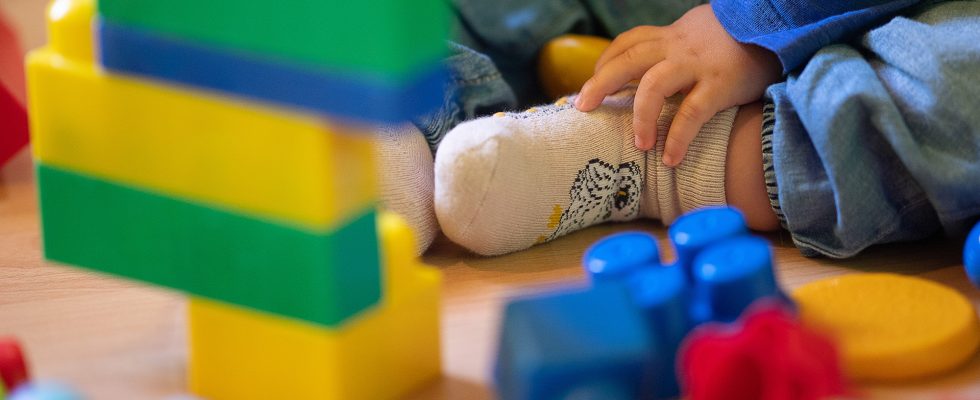Status: 04/25/2023 06:21 a.m
Many low-income families are actually entitled to financial assistance. But they often fail because of bureaucratic hurdles. What’s wrong?
Jaqueline lives in Saarbrücken and has three sons: the eldest is 17, the youngest just one and a half years old. She has worked in the care sector for a long time, also in the kitchen service. It was always tight financially, but somehow she made ends meet.
She lost her job during the Corona lockdown, and since her youngest son was already on the road, she has not found a new job either. That’s why she and her three sons live temporarily on citizen income. And that is extremely scarce despite the frugal lifestyle.
In the last week and a half of the month, she often only has 60 euros left for the whole family, she tells the ARD-Broadcast Plus minus. “Then there’s just rice pudding or pasta with tomato sauce.”
No big purchases
No cinema, no restaurant, no car, no vacation. Many families are like Jaqueline, especially single parents. Jaqueline only makes incisions on herself. The last major “purchase” was a new pair of trousers for 20 euros. “And even then I still had a bit of a guilty conscience,” she says.
A great help for them and other families is the Pedagogical-Social Action Group (PÄDSAK), a community facility in her district of Saarbrücken. The PADSAK offers support in all aspects of life – from support in dealing with the authorities to finding accommodation.
The organization observes that families on a tight budget have had it particularly bad during the corona pandemic. And as soon as the situation eased a little, the next blow came: Inflation hits particularly hard where it is already tightest.
“The price increases and the associated energy crisis will only really have an impact in 2023, because above all families who live on transfer payments and low-income earners are disproportionately affected,” says Eva Jung-Neumann , board member at PÄDSAK.
jumble of forms
There is more support for families with children in Germany than in many other countries: child benefit has been increased to 250 euros, and there are also individual benefits for education and participation, such as subsidies for class trips, tutoring or school supplies. Children are also taken into account for the housing allowance. In addition, low-income families can apply for the new child allowance – up to 250 euros per month.
But: For families who have to live on Hartz IV or citizen’s income, not a cent is added because everything is counted or deducted. And many others with low incomes fail because of the bureaucracy. The mass of forms at different authorities overwhelms many parents. The complex official language and the harsh climate in some authorities deter many.
Jaqueline has observed in herself and others that in the end one often doesn’t have the time and strength to deal with it. “One would be entitled to housing benefit, the other child allowance. And it’s better to get along with less money than to bother with it.”
35 percent use help
The large social organizations such as Caritas have long seen a need to catch up when it comes to supporting families with low incomes. The bureaucracy is also a thorn in her side. “In the case of the child supplement, we assume that only 35 percent of families entitled to claim this benefit. And of course that is far, far too little to help the families effectively,” says Eva Maria Welskop-Deffaa, President of the German Caritas association.
From 2025, the federal government wants to bundle the whole previous mess in the basic child security. Uncomplicated, fast and digital – that’s the promise. And many associations and social experts have been calling for this for a long time.
The basic child security should consist of a guarantee amount that everyone gets – like child benefit today. Plus an additional contribution – depending on the age of the children and the level of family income. In any case, more money would reach the entitled families, says the Caritas President. The issue is also a high priority for the federal government.
Dispute with traffic light government
For Family Minister Lisa Paus (SPD), basic child security is “the central socio-political project of this traffic light government”. It is clearly anchored in the coalition agreement. “And it would simply be a catastrophe for the credibility of the entire traffic light if basic child security did not come,” says Paus. And it is also clear that preventing and reducing child poverty does not come for free.
For the FDP, too, it is undisputed that the confusing tangle of family support cannot go on like this. Christian Lindner, Federal Minister of Finance and head of the FDP, confirms that the task now is “to find an automated, simple digital process. That would be incredibly useful.” This will also trigger several billion euros in additional aid for families.
Basic child security from 2025?
However, whether the current subsidy rates will remain or whether they will be increased is still being discussed. The family minister wants more direct support, the finance minister wants to improve parents’ career opportunities.
After all: Christian Lindner and Lisa Paus confirm that basic child security will come from 2025. And that is – regardless of the details that still have to be fought out – in any case a great deal of bureaucratic relief for the families and the authorities, who previously had to struggle with a wide variety of forms.

